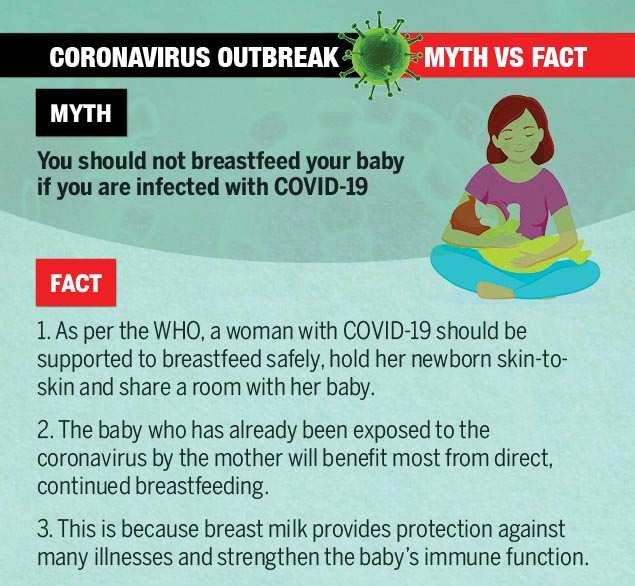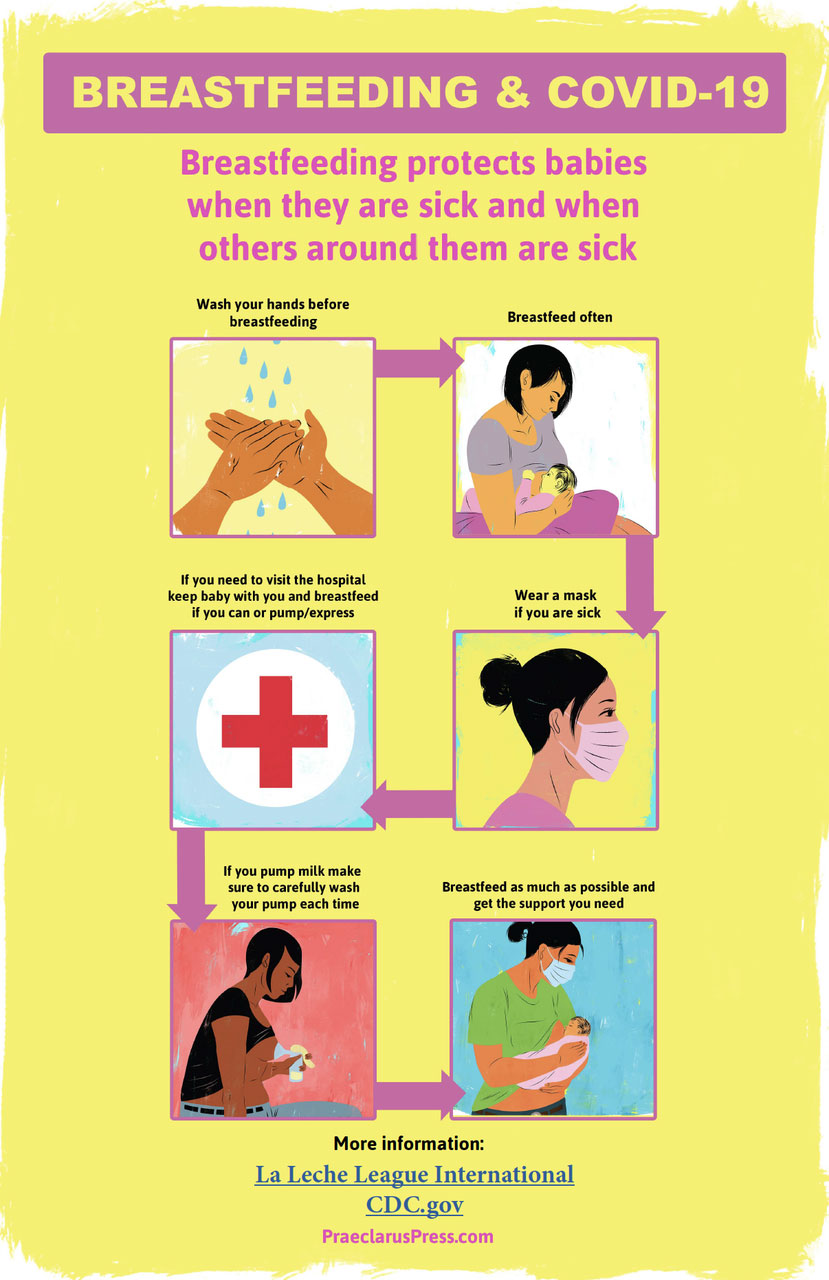Breastfeeding While Sick With Covid
There is no need to stop breastfeeding if you want to get a vaccine. Wash your hands before breastfeeding.
What Do We Know About Breastfeeding And Covid 19
At present data are not sufficient to conclude vertical transmission of COVID-19 through breastfeeding.

Breastfeeding while sick with covid. Yes continue breastfeeding with appropriate precautions. It found that by the age of 2 months breastfed infants saliva contained. According to the CDC recent reports have shown that breastfeeding people who have received mRNA COVID-19 vaccines have antibodies in their breast milk.
If you have been diagnosed with or are suspected of having COVID-19 you and your baby can be supported to remain together while continuing to breastfeed or supply expressed breastmilk for your baby. Benefits of breastfeeding during a pandemic. If you are breastfeeding vaccination with Comirnaty Pfizer is.
Now the new study suggests that breastfeeding after COVID-19 may also help spur a more active immune response in babies. In infants the risk of COVID-19 infection is low the infection is typically mild or asymptomatic while the consequences of not breastfeeding and separation between mother and child can be significant. Through the breastmilk2 Women who are breastfeeding while sick with COVID-19 can help prevent the virus passing the virus to their babies by washing their hands frequently and wearing a mask while breastfeeding2.
The CDC The Center for Disease Control continues to reaffirm the importance of breastfeeding and breastmilk during times of illness such as Covid 19 and during the flu season. Breastfeeding is good for babies. Breastfeeding can offer many perks especially during the COVID-19 pandemic.
None of the WHO-approved COVID-19 vaccines currently being used contain the live virus so there is no risk. The Centers for Disease Control and Prevention CDC and the American Academy of Pediatrics say that breastfeeding individuals with COVID-19 can successfully breastfeed. Breastfeeding can offer many perks especially during the COVID-19 pandemic.
Supporting mothers to breastfeed. They can also consider pumping milk for someone else to feed their baby while they recover. While most experts recommend continued breastfeeding while you are infected with COVID there is a lot of confusing information out there and its easy to feel unsure about what to do if you or someone in your household catches COVID.
The decision to start or continue breastfeeding should be a shared decision made between the breastfeeding parent the family and the health care provider. These include wearing a mask if available washing your hands with soap and water or with an alcohol-based hand rub before and after touching your baby and routinely cleaning and disinfecting surfaces you have touched. Even with COVID-19 the disease caused by the novel coronavirus our best evidence suggests that breast milk is the safest way to feed babies.
The CDC has information on COVID-19 and breastfeeding at. Is it safe to continue breastfeeding after receiving a COVID-19 vaccine. Wear a mask while breastfeeding and whenever you are within 6 feet of your baby.
Yes ACOG recommends that breastfeeding women get a COVID-19 vaccine. Breastmilk is very unique and can lessen the chance of serious respiratory symptoms due to illness. 2 Breastfeeding helps protect babies from a variety of illnesses and importantly keeps mothers and babies together.
Mothers with COVID-19 or with symptoms of illness are encouraged to use the following precautions when breastfeeding their infant or expressing breast milk. Because non-replicating vaccines pose no risk for lactating people or their infants COVID-19 vaccines are also thought to not be a risk to the breastfeeding infant. 3 This is because breastmilk contains antibodies and other immune protective factors.
While studies have not found SARS-CoV-2 in breast milk COVID-19 can be transmitted by respiratory droplets. Avoid people who are sick. Use your own breast pump one not shared with anyone else if possible.
Breastfeeding support has inevitably changed as a result of COVID-19. Brown and Shenker 2021 conducted a United Kingdom UK online survey with 1219 mothers of babies aged 012 months to gain insight into their breastfeeding experiences during the pandemic. If you have COVID-19 and choose to express breast milk.
Wear a mask as you express breast milk. Cover your nose and mouth when you cough or sneeze using the crook of your elbow is a good technique and throw away any tissue used immediately and wash hands well. Take additional hygiene measures and continue to breastfeed if you fall sick Mothers who get coronavirus shortly before giving birth and begin breastfeeding and those who become infected while breastfeeding will produce immune factors antibodies in their milk to protect their baby and enhance the babys own immune responses.
Talk to your doctor to help decide whether you should continue to breastfeed and how to do it safely. As researchers in the field of breastfeeding and human lactation we are asking many questions about the safety of breast milk from mothers who are sick with COVID-19 the impact of COVID-19 on. If you are symptomatic or have an active infection you can still pump and have a healthy caregiver feed baby until you are cleared to directly breastfeed.
People who are breastfeeding while sick with COVID-19 can help prevent passing the virus to their babies through contact by washing their hands frequently and wearing a mask while nursing. There are publications that have looked at antibodies in breast milk from vaccinated individuals and have been able to detect those antibodies. Breastfeeding can help protect infants from infection and breastfed infants are less likely to have severe respiratory symptoms according to the guidance.
What might this mean for breastfed babies. Should I breastfeed if I have or suspect I have COVID-19. When you get vaccinated the antibodies made by your body may be passed through breastmilk and may help protect your child from the virus.
But new moms with COVID-19 could spread the virus to their infant through tiny droplets that spread when they talk cough or sneeze. People who are breastfeeding while sick with COVID-19 can help prevent passing the virus to their babies through contact by washing their hands frequently and wearing a mask while nursing. This interim guidance is intended for healthcare providers and lactation specialists who care for breastfeeding people and their infants and children who receive breast milk feeds during the COVID-19 pandemic.
Yes you should continue breastfeeding after vaccination to protect your baby. It protects them from many infections. Coronavirus Disease COVID-19 and Breastfeeding.
If you have COVID-19 and choose to breastfeed. You can even breastfeed if you test positive for COVID-19 or are not fully vaccinated as long as you take extra safety precautions to protect your baby. They can also consider pumping milk for someone else to feed their baby while they recover.
Its safe to breastfeed if you have COVID-19. You can even breastfeed if you test positive for COVID-19 or are not fully vaccinated as long as you take extra safety precautions to protect your babyIf youre fully vaccinated against COVID-19 you do not need to take any special precautions when feeding your baby at the breast or expressing milk.

Um Today Breastfeeding Is Recommended During Pandemic But Coronavirus Has Changed Support Systems
Cdc If You Have Decided To Breastfeed Your Baby And Have Covid 19 Wear A Mask While Breastfeeding And Whenever You Are Within 6 Feet Of Your Baby Find More Tips For
World Health Organization Who Close Contact And Early Exclusive Breastfeeding Helps A Baby To Thrive A Woman With Covid 19 Should Be Supported To Breastfeed Safely Hold Her Newborn Skin To Skin

Covid 19 Breastfeeding Kidshealth Nz
If A New Mother Becomes Ill With Covid 19 Should She Stop Breastfeeding Her Child Times Of India


Posting Komentar untuk "Breastfeeding While Sick With Covid"